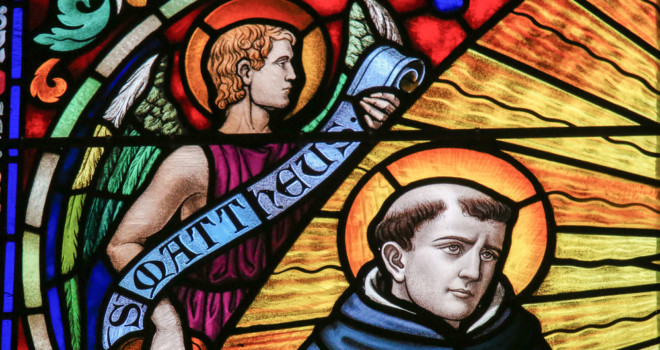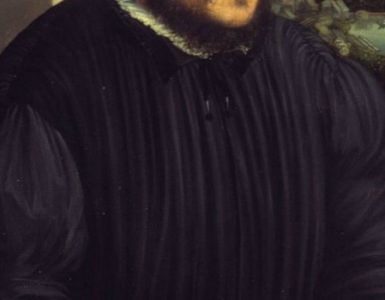Do not fail to imitate the lives of saintly and noble men.
So Many Saints So Worthy of Our Imitation
What a great boon we all have in our heavenly extended family, the glorious communion of saints God has given us, through their willingness to devote themselves to Him. With their Christ-centered heroic virtue, the saints can inspire and teach us all. The awesome self-discipline so many saints manifested and the external trials they endured should put into proper perspective the minor inconveniences and self-deprivations we undergo to pursue learning.
Among the most noble and saintly of men we should strive to imitate is St. Thomas Aquinas, who, in his imitation of Christ, so devoutly exercised the great gifts God gave him. Thomas was a member of St. Dominic’s Order of Preachers, the order with the motto of Veritas (Truth), the order upheld by study itself as one of its four pillars (the others being prayer, community, and preaching). The Dominican charism, with its intellectual bent, has been closest to my heart and mind since I was taught in grade school by wonderful Dominican Sisters.
Still, I thank God for the wonderful charisms and gifts of all the holy religious orders and the legions of saints they’ve produced. Who cannot be inspired by the glorious lives and loving deeds of St. Benedict and his Benedictines, St. Francis and his Franciscans, St. Ignatius and his Jesuits, and so many more holy orders formed in so many nations across the centuries?
Of course, great saints are not only members of religious orders. In fact, there are great saints from every age since Christ established the Church, from virtually every nation, from both sexes, and from almost every occupation and state in life. Further, there are saints who have suffered and triumphantly endured almost every kind of difficulty, distress, disease, or disorder that you and I might face.
There are very good reasons we can track down a patron saint for almost everything! It is most important, per Thomas, that we do track them down, and find what lessons and inspirations they hold for us. We can learn so much from saints with whom we can closely identify and oftentimes who seem so different from us, at least on the surface.
If I might offer a personal example, I am often absorbed in the study of the writings of Sts. Albert the Great and Thomas Aquinas (of course), two of the most profound minds in history. A few years ago, I was asked to deliver a talk on St. Martin de Porres (1579–1639) to a Dominican group. I knew this saint lived in Peru, and I knew that whereas Albert and Thomas are often depicted holding a globe, or a church, or a massive book in their hands, St. Martin is often shown holding a broom. I wasn’t sure what to expect when I delved into the life of this saint, but what I discovered exceeded my wildest dreams. This great saint of mixed race was a champion of drawing together the rich and the poor and those in between, African slaves, Spanish rulers, and indigenous peoples of Peru. His love of animals would bring a smile to the heart of any Franciscan or Irish saint, and while he was happy to sweep floors, he was also so adept with the surgeon’s scalpel that archbishops called upon him when ill.

This article is from a chapter in How to Think Like Aquinas. Click image to learn more.
Perhaps my greatest surprise about Martin was that this humble, loving man was also fond of St. Thomas and well-versed in the lessons of the Summa Theologica, sometimes providing citations or explanations to seminary students when he overhead them discussing their confusion as he cleaned or swept the floors!
Another saint dear to my heart, and similar to Martin in some ways, is the humble, loving Little Flower, St. Thérèse of Lisieux (1873–1897). How remarkable that this nun who died so young would be named, like Sts. Albert and Thomas, among the few dozen Doctors, or great teachers, of the Church. So would St. Catherine of Siena (1347–1380), though she received no formal education and did not even learn to read until she was in her twenties!
The saints were indeed a great help to St. Thomas, at times in the most striking ways. Thomas’s friend and secretary, Brother Reginald, reported that once Thomas himself became puzzled for days over the interpretation of a text in Isaiah while writing a commentary on that book. One night while he stayed up in his room to pray, Reginald heard Thomas speaking out loud, it seemed to him, with others in his room, though he could not make out the voices or the words they said. Soon after the voices stopped, Thomas called out:
“Reginald, my son, get up and bring me a light and the commentary on Isaiah; I want you to write for me.” So Reginald rose and began to take down the dictation, which ran so clearly that it was as if the master was reading aloud from a book under his eyes.
When Reginald repeatedly asked Thomas about the voices he heard,
Thomas finally replied that Sts. Peter and Paul were sent to him, “and told me all I desired to know.”
Of course, the main reason we should imitate the saints is that they all became saintly by imitating Christ. It is Christ, first and foremost, whom they help us imitate, by showing how a life centered on Christ is possible anywhere in the world at any time in history.
It was St. Peter who responded when Christ asked him if he would leave Him: “Lord, to whom shall we go? You have the words of eternal life” (John 6:68). It was St. Paul who declared, “I have been crucified with Christ; it is no longer I who live, but Christ who lives in me” (Gal. 2:20). It is Christ, you will recall, whom St. Thomas called the greatest of all teachers, who taught through His words and His deeds. We are all called to imitate Him foremost.
Do Not Overlook the “Merely” Noble!
(Turning Water into Wine)
In his masterwork, the Summa Theologica, Thomas respectfully considered the pronouncements of many great saints of the West and the East, from Augustine to Jerome to Pope Gregory the Great to John Chrysostom, Athanasius, Gregory Nazianzen, and so many others. Further, he sought out the truths and the pearls of wisdom in the writings of those who he knew did not possess the fullness of truth of the Catholic Church. These include thinkers such as the Greek pagan Aristotle and the Roman pagans Cicero and Seneca, and many others; the Jewish Maimonides; and the Arab Muslims Averroes and Avicenna. Thomas cherished truths wherever they might be found, and indeed, this is a hallmark of the Catholic Church. Revelation fears no truths of reason, for there is only one truth. Closer to our time, St. John Paul II stated the gist of Thomas’s maxim most elegantly:
Closer scrutiny shows that even in the philosophical thinking of those who helped drive faith and reason further apart there are found at times precious and seminal insights which, if pursued and developed with a mind and heart rightly tuned, can lead to the discovery of truth’s way.
Some theologians in St. Thomas’s day were highly critical of his use of philosophy in general, and Aristotle in particular, for their service to theology. They argued that he was diluting the wine of divine wisdom with the water of human wisdom.
Thomas, however, knew that there is only one truth and that the truth of the faith could never be contradicted by reason, but that reason could help draw some people to faith and help clarify theological principles for the faithful. He did not believe that the noble philosophy of noble men diluted the Faith whatsoever, but rather, that “those who use philosophical doctrines in sacred Scripture in such a way as to subject them to the service of faith, do not mix water with wine, but change water into wine.”
May we, like St. Thomas, thirst for the clear sparkling waters of reason, and all the more for the wine of sacred wisdom and the wine above all wines that becomes Christ Himself in the Eucharist!
Prescription for Letting the Saints Go Marching into Your Soul
Reflect
Do you have a favorite religious order whose charism calls out to you? If so, have you considered joining as a lay affiliate? Do you have some favorite saints? If so, what have you done lately to imitate them, especially in regard to their pursuit of truth? If not, might you consider seeking out some new saints to learn from and pray to for their intercession? Our world is desperately in need of saintly heroes.
Read
Have you made time lately to read the life of a saint unfamiliar to you or a new book about an old favorite? There are a slew of biographies to choose from. If you have a penchant for novels, I’ve found the works of Louis de Wohl as enlightening and inspiring as they are entertaining. (My favorite? Well, as you might guess, The Quiet Light, about St. Thomas Aquinas, is surely a top contender.) Have you read lately the writings of the saints themselves — St. Thomas, or a whole world of others? Have you recently read the Gospels or a good book about Jesus Christ?
If you would care to imitate Christ, one of the world’s greatest spiritual classics is Thomas à Kempis’s Imitation of Christ. It has come out in countless editions across the centuries, and just recently in a version that also fleshes it out and brings it even more alive with well-researched and well-written fictionalized episodes about the life of Thomas à Kempis and the circumstances surrounding the crafting of this simple, yet profound devotional book. This new work is Timothy E. Moore’s The Imitation of Christ, Book I: With Comments, Edits, and a Fictional Narrative.
image: jorisvo / Shutterstock.com
Editor’s note: This article is adapted from a chapter in Dr. Vost’s How to Think Like Aquinas: The Sure Way to Perfect Your Mental Powers. It is available from Sophia Institute Press.












